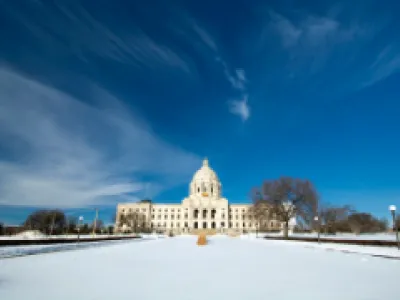Update from the Minnesota legislature

Published March 2, 2020
Good morning from St. Paul! The legislature has been in session for two and a half busy weeks, and here is an update on some important energy issues that we are tracking so far.
Energy conservation opportunities for rural Minnesotans
CUB is advocating for a conservation program that will ensure that everyone in the state, regardless of geography and energy source, can access the financial benefits of conservation.
For decades, Minnesota utilities have been required by law to help their customers save energy through the Conservation Improvement Program. Utilities help people and businesses lower their energy bills with rebates on efficient appliances, discounted home energy audits, and more. Minnesota utilities have operated these programs for decades with proven success.
However, more than 15% of Minnesota households heat with propane, fuel oil, or wood -- mainly in rural areas not served by natural gas utilities. There are no utility conservation rebates for these delivered fuels. At the same time, these households generally face higher heating bills because of the cost of the fuels. Their bills can be quite unpredictable, too, as the price of delivered fuels sometimes fluctuates greatly over the winter months.
CUB has been working with stakeholders to design a Rural Access Conservation Program so that rural Minnesotans have the same opportunities for cost-effective energy conservation as their counterparts in larger cities.
Clean Energy First
As the name suggests, the Clean Energy First bill would require utilities to use clean sources of electricity unless they demonstrate that to do so would increase the costs or make the electricity system unreliable. The bill follows the basic framework of a state law that has been in place for nearly 30 years prohibiting a new non-renewable energy facility unless a utility has first demonstrated that using renewable energy is not in the public interest. Clean Energy First would expand the types of clean energy that must be considered. The bill also includes provisions to increase the local hiring to build clean energy resources, to help communities transition where power plants will close, and to plan for electricity transmission needs.
The Senate Energy Committee passed its version (SF 1456) on February 27; it now heads to the Senate Finance Committee and is expected to be passed onto the Senate floor. The House Energy Committee plans to hear its version (HF 1405) tomorrow.
We are happy to see interest and movement towards clean energy. The House bill presents a smart framework to guide Minnesota’s transition to clean electricity production. While there are some provisions that are not ideal from CUB’s perspective (for instance, it tilts the scales toward utility ownership of new power generation resources, and allows utilities to recover costs through riders on customers’ bills without the full consideration that happens during general rate increase requests), the bill represents a good compromise. It would reward utilities for aggressively pursuing clean energy; have protections for reliability and affordability; set a preference for local, well-paying energy jobs; and, importantly, require utilities to share data and analysis. The Senate version of the bill, unfortunately, contains provisions that would shift electricity costs onto residential and small business customers, erode consumer protections, and allow resources that emit carbon to qualify as “carbon free.” I wrote earlier this year about CUB’s concerns regarding a previous Senate version, and those concerns remain today.
The House and Senate are expected to pass their respective bills, which would set up a robust negotiation between the two bodies.
Conservation Improvement Program changes
For more than a year, stakeholders have been trying to come together over language to modernize the Conservation Improvement Program mentioned above. The program continues to be successful in cost-effectively cutting energy waste. However, it could be improved by allowing consumers to switch from fossil fuels to electricity where it makes financial and environmental sense to do so. For instance, households that heat with propane can often save money and reduce emissions by installing an air source heat pump rather than a traditional air conditioner. Utilities have not been allowed to provide incentives for this kind of “fuel switching” under the Conservation Improvement Program, and a proposed reform to the program would make it possible.
I’m at the Capitol every week working to make sure that legislators understand the policies they are discussing would affect regular Minnesotans, and will continue to share updates throughout the session on this blog and CUB’s Twitter feed.